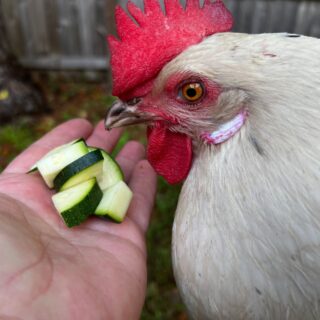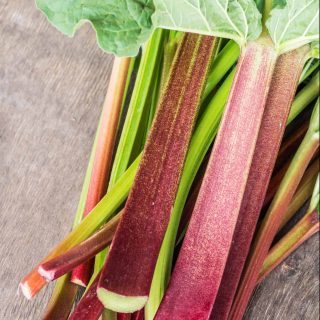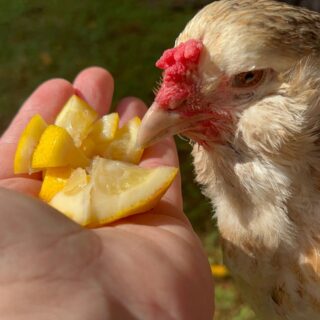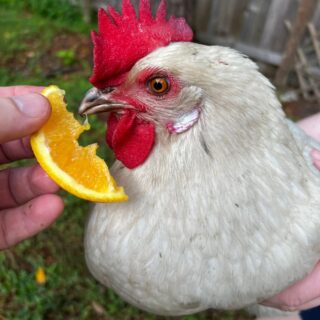Wild onions grow in just about every part of North America and even stretches as far south as Cuba. There are also many other places in the world that cultivate onions where they do not grow naturally. We say that to say, it's likely where you have chickens, there will also be wild onions growing. So, can chickens eat onions, wild or store bought, or is this a ticking time bomb waiting to go off?
The answer to that question is a bit more complicated than most other chicken treats. Keep reading to find out why!
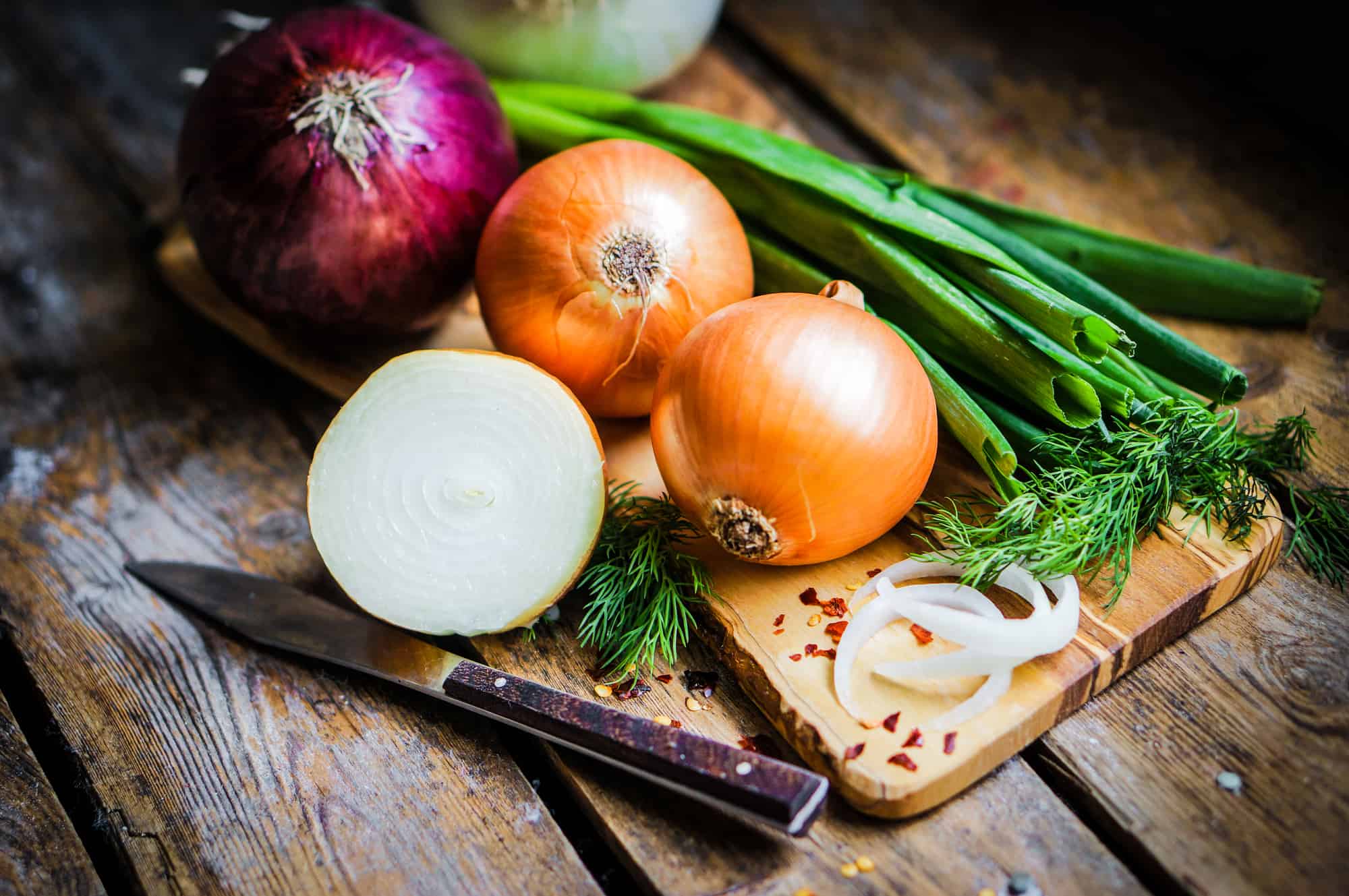
[ez-toc]
Can Chickens Eat Onions?
Yes, chickens can definitely eat onions. Onions can be a healthy part of a balanced diet or the precursor to some major health issues. The key in staying on the healthy end versus the other is all in the amount they eat.
Let's learn what that means.
Are onions safe for chickens to eat?
In general, yes, onions are safe for chickens to eat. However, it's not really as simple as a nice, clean, yes or no. Let's look a bit closer at what is edible and safe, what is not, and what problems can arise.
What part of the onion is edible?
Like how chickens can eat mango and chickens can eat tomatoes, the fruit or vegetable is fine, and even healthy, to eat but the stalk, leaves, and flowers of the plant can be toxic; sometimes enough to make them feel bad and others can be fatal. That is the case with onions as well.
Skip anything green that grows above the ground and stick to giving them the bulb that grows in the dirt. They can also eat the peel but generally won't
Also, contrary to what some may say, chickens are not allergic to onions. Onions can be harmful but not due to any sort of allergy.
Need some help keeping your chickens health and care taken care of? Check out the Organized Chicken Keeper for an easy to follow system.
What are the nutritional benefits of onions for chickens?
Onions, in moderation, are a good, low calorie food that is also high in protein, carbs, some healthy fats, various vitamins, minerals, and antioxidents.
The table below, courtesy of the USDA FoodData Center, is the nutritional value of 1 medium, raw, white onion (110 g).
| Name | Amount | Unit |
|---|---|---|
| Water | 98 | g |
| Energy | 44 | kcal |
| Protein | 1.21 | g |
| Fat | .11 | g |
| Carbohydrate, by difference | 10.3 | g |
| Fiber, total dietary | 1.87 | g |
| Sugars, total including NLEA | 4.66 | g |
| Calcium, Ca | 25.3 | mg |
| Magnesium, Mg | 11 | mg |
| Potassium, K | 161 | mg |
| Sodium, Na | 4.4 | mg |
| Copper, Cu | 0.043 | mg |
| Manganese, Mn | 0.142 | mg |
| Selenium, Se | 0.55 | µg |
| Vitamin C, total ascorbic acid | 8.14 | mg |
| Vitamin B-6 | 0.132 | mg |
| Folate, total | 20.9 | µg |
| Carotene, beta | 1.1 | µg |
| Vitamin A, IU | 2.2 | IU |
| Vitamin K (phylloquinone) | 0.44 | µg |
How are these nutrients beneficial?
Here's a small sample of how a proper amount of onions and the nutrients they provide can help improve your chickens' health.
- Antioxidants: repair damage from free radicals, fight off/prevent future damage, protect from oxidative damage, anti-inflammaty, lower blood pressure, improve heart health in high enough doses, development and health of tissue, skin, and feathers
- Vitamin B6: healthy blood vessels, eye/vision health, nervous system , immune system
- Vitamin C: joint, cellular, and immune health; collagen synthesis
- Calcium: bones and egg shell strength
- Fiber: only small amounts or they can become constipated, get a blockage, etc; enery, growth, and digestive health, reduce cholesterol, controls blood sugar, digestive health
- Folate (B Vitamin): folate deficiency; helps blood formation; healthy feathers & size
- Vitamin K: blood clotting, bone metabolism
- Magnesium: bone strength and development, cellular metabolism, heart health, muscle function
- Manganese: bone development, immune system, breaks down carbs, cholesterol, and amino acids; controls blood sugar
- Potassium: temperature control; hydration & electrolyte regulation, metabolism; heart health/heart disease preventative
What happens if chickens eat onions?
In small quantities, chickens can eat onions with no problems. In fact, as we said above, they can even benefit from onions being in their diet. However, large quantities can be very harmful to chickens, as well as some pets and livestock.
Onions have a toxin in them called "n-propyl disulfide". This toxin has been linked to "oxidative damage to erythrocytes, resulting in hemolysis" which can then become Heinz or hemolytic, anemia. This form of anemia is when a chicken's bloodstream has all of it's red blood cells "destroyed…before their normal lifespan is up."
Some of the more apparent symptoms are a general unwell appearance (ruffled feathers, puffed up, weight loss), loss of strength in their legs, loss or change of color in their feathers, combs, and wattles, and an overall demeanor of lethargy.
A much less severe negative effect is that it can sometimes change the flavor of their eggs. We're not sure if there are any studies behind this but it is a pretty popular belief. We have not experienced this ourselves so we cannot really offer an opinion.
How to feed them?
Chickens don't typically care for the overwhelming scent and flavor of onions. Feed them mixed in with things they prefer. Chickens can eat blueberries, chickens like to eat bananas and chickens eat cantaloupe to name a few.
Cooked in a skillet
But, if you want to prepare some for them anyway, you can make them more appealing by cooking them a little first. Now, don't make a delicious, perfectly seasoned stiry fry for your chickens. The extra oil, fat, salt, and other seasonings can be harmful. Instead toss them in a skillet with a bit of water and let them sizzle enough just to soften up and make them easier for your chickens to eat and digest.
Roasted
Cut the onion up and place them in the oven to roast them. Let them heat up until they are soft but not to the point that they caramelize. You can then mix them up with some other fruit, veggies, table scraps, their chicken feed, or even make a chicken trail mix out of cooked onions and meal worms (I can hear your mouth watering from here).
Just take note, cooking them is just to make them more appealing and easier to eat. Cooking will not destroy the n-propyl disulfide.
Food and Fun
One other way you can serve them is to have your treat play double duty. Since onions seperate into rings why not run a string through them and hang them up as a DIY chicken toy? This boredom buster can keep your chickens fed and entertained for a while. Plus, it's fun to watch.
How many and how often can I feed onions to my chickens?
Due to the potential toxicity of onions, we don't recommend making them a large part of their diet. Generally, we go by the 90/10 rule for chicken treats. Meaning that 90% of their diet should be a chicken specific feed, created with the nutrients a chicken needs for a balanced diet and only 10% should be other various treats.
Final Word
As you can see, chickens can eat onions but there is a lot to think about when feeding it to them. Depending on the amount they eat, onions can be very beneficial due to the sheer amount of beneficial nutrients or they can be detrimental by leading to anemia and other health issues.
Bottom line, be safe, and be conscious of what and how much you feed to your chickens.
If you need more help with taking care of your chickens, check out The Organized Chicken Keeper for a complete system for managing their health through keeping their supplies stocked and coop clean.

